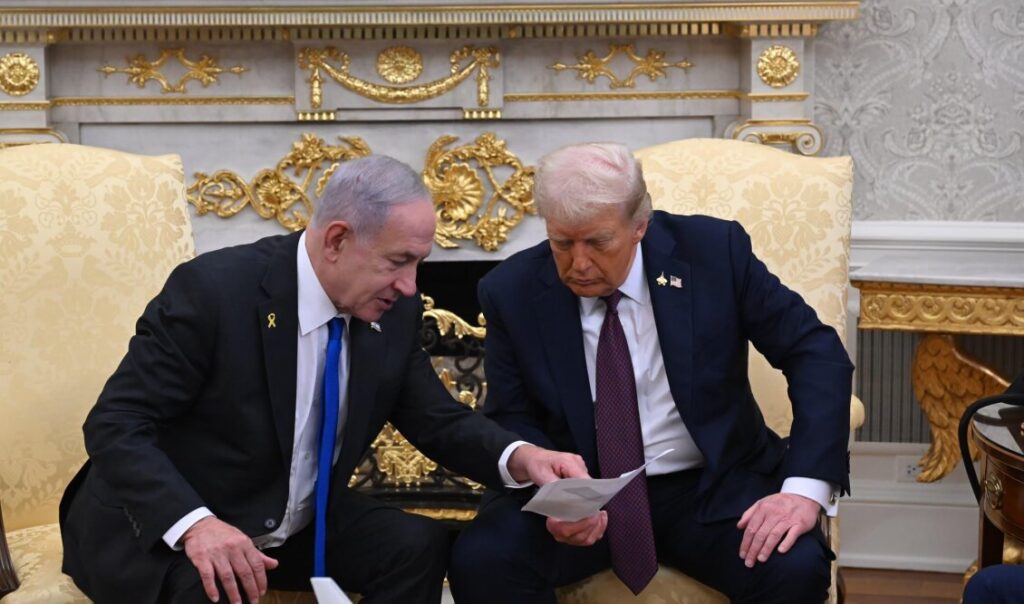Donald Trump – while not characterized by “stability” in his public statements – has not hidden his ambition to change the map of the Middle East, something that became evident in the extensions of the plan he proposed for Gaza, with Israeli Prime Minister Benjamin Netanyahu by his side. A key pillar is the “Abraham Accords,” the cornerstone of his Middle East policy during his first term, which decoupled the prospect of normalizing Israel’s relations with its neighbors from the longstanding demand of the Arab world: the establishment of a Palestinian state.
Trump and Netanyahu: The strategy for expanding the Abraham Accords
The declared goal of Washington and Tel Aviv is to expand this framework (not only in the Middle East region, though that is clearly the epicenter), with the American president dropping a “bombshell” that perhaps went relatively unnoticed in joint statements with Netanyahu: that Iran could become part of them. “I bet at some point Iran will become a member of the Accords. And I had no idea it would take this turn. This was a turn we achieved with the B-2s. But I think it may well happen,” the American president said specifically, referring to the bombing of Iranian nuclear facilities in June.
If such a thing were confirmed, it would be an unprecedented reversal, given that just 15 months ago, in July 2024, Netanyahu, addressing Congress, spoke of an “Abraham Alliance” against Iran, based on the role played by Jordan, Saudi Arabia, and the United Arab Emirates in the conflict between Israel and Iran three months earlier, in April of the previous year.
The big prize is Saudi Arabia joining the Accords framework, normalizing its relations with Israel
The big prize: Saudi Arabia
Certainly, the big prize is Saudi Arabia joining the Accords framework, normalizing its relations with Israel, an event of particular significance given Riyadh’s role in the Islamic world and its economic size. While there may not be explicit reference to the issue at this moment, the prospect of this becoming reality was perhaps closer than Saudi Arabia’s declared stance regarding the prerequisite existence of a Palestinian state before following the path of Bahrain and the United Arab Emirates (speaking exclusively of Gulf countries).
It was no coincidence that the Wall Street Journal reported that one of the possible reasons for Hamas’s October 7 attack was the potential Saudi Arabia-Israel agreement, which could have been detrimental to Palestinian statehood. “Saudi Arabia is ready to sign the ‘Abraham Accords'” after the Gaza war ends, former Mossad chief (2016-2021) Yossi Cohen said characteristically to the Jewish Chronicle during his book presentation on Sunday (28/9), linking this development to the need for American protection so that Riyadh would not face retaliation from Tehran. He expressed confidence that this is exactly what Trump will do, although Saudi Arabia is also making its own major moves on the geopolitical chessboard (see the agreement with Pakistan signed weeks ago).
Syria’s prospects
For months there has been discussion about extending the “Abraham Accords” to Syria as well. After all, Ahmed al-Sharaa shows he has prioritized turning to the West in his foreign policy, focusing on lifting sanctions imposed on the Assad regime, while channels with Israel remain obviously open, despite the “fire” from the de facto head of the Syrian government over Tel Aviv’s strikes against targets within Syrian territory and its support for the Druze. Al-Sharaa himself, speaking with former CIA director David Petraeus at an event on the sidelines of the UN General Assembly, said that security consultations are underway, but these do not reach “Abraham”-type normalization agreements. As previously noted and stated by Al-Sharaa himself to Saudi media in August, Syria’s difference from other countries that signed these agreements with Israel is the “thorn” of occupied territory, referring to the Golan Heights. THE “FAN” The “Abraham Accords,” however, are not based solely in the Middle East, but the “fan” can open to the Caucasus as well.
Thus, Reuters reported two months ago Trump’s goal to include Azerbaijan in this framework, as well as Kazakhstan, Uzbekistan, Turkmenistan, Tajikistan, and Kyrgyzstan. Certainly, the focus is on Baku, with the American president’s right-hand man, Steven Witkoff, reportedly having met with Azerbaijani President Ilham Aliyev in March, while in August Aliyev signed a “historic” peace agreement with Armenian Prime Minister Nikol Pashinyan at the White House.
Published in Parapolitika on 4.10.2025




